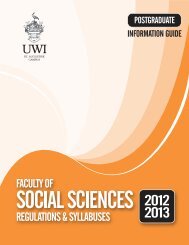Faculty of Humanities and Education (Postgraduate) - The University ...
Faculty of Humanities and Education (Postgraduate) - The University ...
Faculty of Humanities and Education (Postgraduate) - The University ...
Create successful ePaper yourself
Turn your PDF publications into a flip-book with our unique Google optimized e-Paper software.
POSTGRADUATE REGULATIONS & SYLLABUSES 2012 - 2013<br />
THE FACULTY OF HUMANITIES & EDUCATION<br />
3. Health Promotion in the Caribbean<br />
a. Historical, economic <strong>and</strong> theoretical contexts<br />
b. Strategies <strong>of</strong> the Caribbean Charter on Health<br />
Promotion<br />
c. Ethical, social justice, cultural, <strong>and</strong> human rights<br />
issues<br />
4. Models <strong>and</strong> theories used in Health Promotion<br />
(Interpersonal, Intrapersonal <strong>and</strong> Community) – Explanation<br />
<strong>and</strong> critique<br />
a. <strong>The</strong> Health Belief Model<br />
b. Social Cognitive <strong>The</strong>ory<br />
c. <strong>The</strong> Trans-theoretical Model<br />
d. Social Learning <strong>The</strong>ory<br />
e. Precede/Proceed Model<br />
f. <strong>The</strong> theory <strong>of</strong> reasoned action <strong>and</strong> planned<br />
behaviour<br />
g. Diffusion <strong>of</strong> innovation theory<br />
h. Community Organization Model<br />
5. Health Communication <strong>and</strong> Advocacy<br />
a. Provider/client relations<br />
b. Social <strong>and</strong> community health issues<br />
c. Media issues<br />
d. Agenda setting <strong>and</strong> advocacy for healthy public<br />
policy<br />
6. Principles <strong>of</strong> Social Marketing & the SMART (Social<br />
Marketing Assessment <strong>and</strong> Response Tool) Model<br />
7. Assessing health beliefs <strong>and</strong> health behaviours<br />
a. Life-stress review<br />
b. Spiritual health Assessment<br />
c. Social support systems review<br />
d. Lifestyle Assessment<br />
8. Steps in<br />
i. Planning a Health Promotion Programme<br />
j. Implementing a Health Promotion Programme<br />
k. Evaluating a Health Promotion Programme<br />
9. <strong>The</strong> Settings Approach in Health Promotion<br />
l. School<br />
m. Workplace<br />
n. Community<br />
o. Health Services<br />
10. Resource Mobilisation in Health Promotion<br />
11. Development <strong>of</strong> a Health Promotion Plan<br />
Major competencies to be developed<br />
• A sound theoretical base in health promotion, health<br />
communication, prevention, <strong>and</strong> behaviour change<br />
• Enhanced skills in application <strong>of</strong> key principles <strong>and</strong> issues<br />
for health promotion.<br />
• A repertoire <strong>of</strong> pedagogical approaches to health<br />
promotion development<br />
• Enhanced skills to develop health promotion policies,<br />
strategies, <strong>and</strong> interventions at community, institutional,<br />
<strong>and</strong> governmental levels<br />
• Critical <strong>and</strong> creative thinking (e.g. in social marketing<br />
strategies)<br />
• Practical skills for forming synergistic partnerships to<br />
strengthen health promotion strategies<br />
• Enhanced skills for managing social prejudices <strong>and</strong> taboos,<br />
so that they don’t impede important health promotion<br />
activities<br />
• Insights into the political <strong>and</strong> ideological dimensions <strong>of</strong><br />
health<br />
• Ability to formulate advocacy <strong>and</strong> lobbying strategies<br />
• Enhanced capacity to underst<strong>and</strong> <strong>and</strong> manage human<br />
behaviours <strong>and</strong> social interactions<br />
• Enhanced confidence, comfort, <strong>and</strong> competency to deal<br />
with sexual <strong>and</strong> gender diversity<br />
• Enhanced skills to infuse health promotion within<br />
humanistic, human rights, <strong>and</strong> social justice principles<br />
• <strong>The</strong> ability to evaluate health promotion at an institutional<br />
level<br />
• <strong>The</strong> ability to plan <strong>and</strong> implement health promotion<br />
strategies at a local institutional level<br />
ASSESSMENT<br />
Project that involves developing a health promotion plan to<br />
address a contemporary health issue 40%<br />
Examination 60%<br />
Required reading<br />
DiClemente, R. J., Crosby, R. A., Kegler, M. C. (2002) Emerging<br />
theories in health promotion practice <strong>and</strong> research: strategies<br />
for improving public health. Jossey-Bass. (ISBN: 0787955663).<br />
Freire, P. (2000). Pedagogy <strong>of</strong> the oppressed. New York:<br />
Continuum International Publishing. (ISBN: 0826412769)<br />
Glanz, K., Rimer, B. K., Viswanath, K. Eds. (2008). Health behaviour<br />
<strong>and</strong> health education: theory, research, <strong>and</strong> practice (4 th<br />
edition). Jossey-Bass. (ISBN: 9780787996147)<br />
Maibach, E., Parrott, R. L. (1995). Designing health messages:<br />
approaches from communication theory <strong>and</strong> public health<br />
practice. Sage. (ISBN: 0803953984)<br />
McKenzie, J. F., Neiger, B. Smeltzer, J. L. (2004). Planning,<br />
implementing, <strong>and</strong> evaluating health promotion programs:<br />
a primer (4 th Ed.). Benjamin Cummings. (ISBN: 0805360107).<br />
Naidoo, J. (2000). Health Promotion: Foundations for practice (2 nd<br />
Ed.). New York: Baillière Tindall. (ISBN: 0 621 171105 2 3)<br />
Nutbeam, D., Harris, E. (2004). <strong>The</strong>ory in a nutshell: A practical<br />
guide to health promotion theories (2 nd Ed.). McGraw-Hill.<br />
(ISBN: 0074713329).<br />
111

















